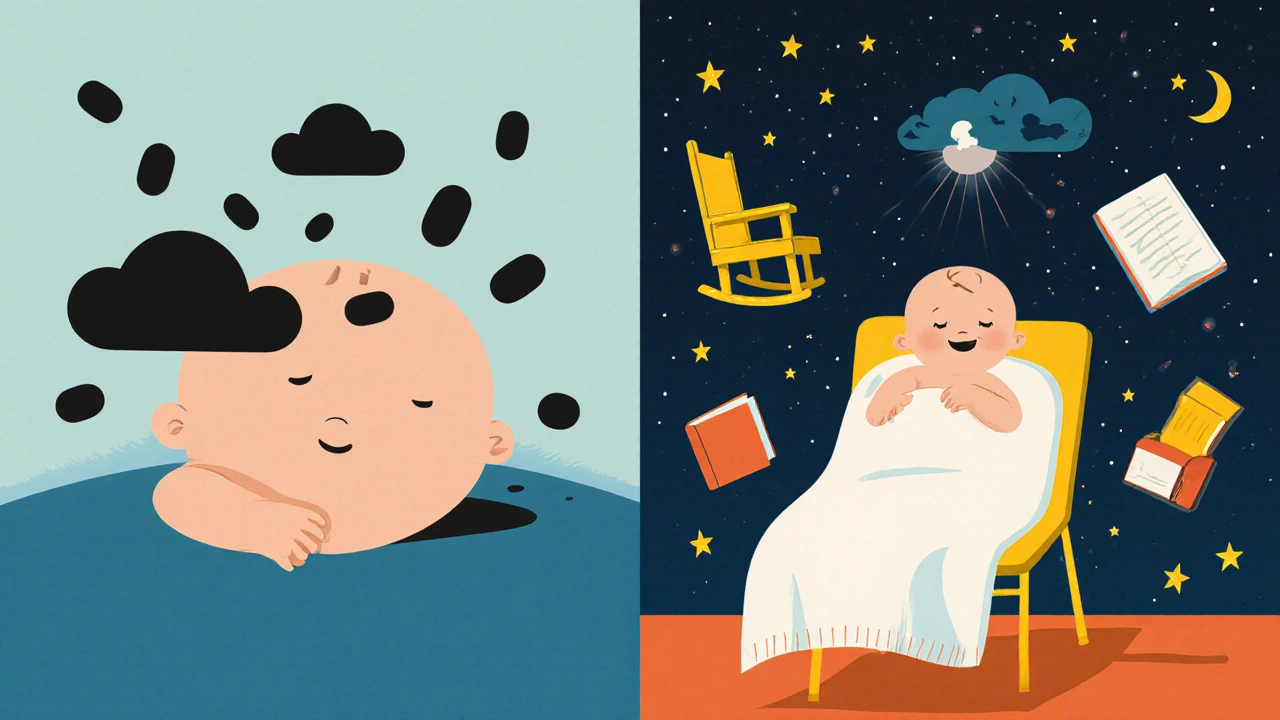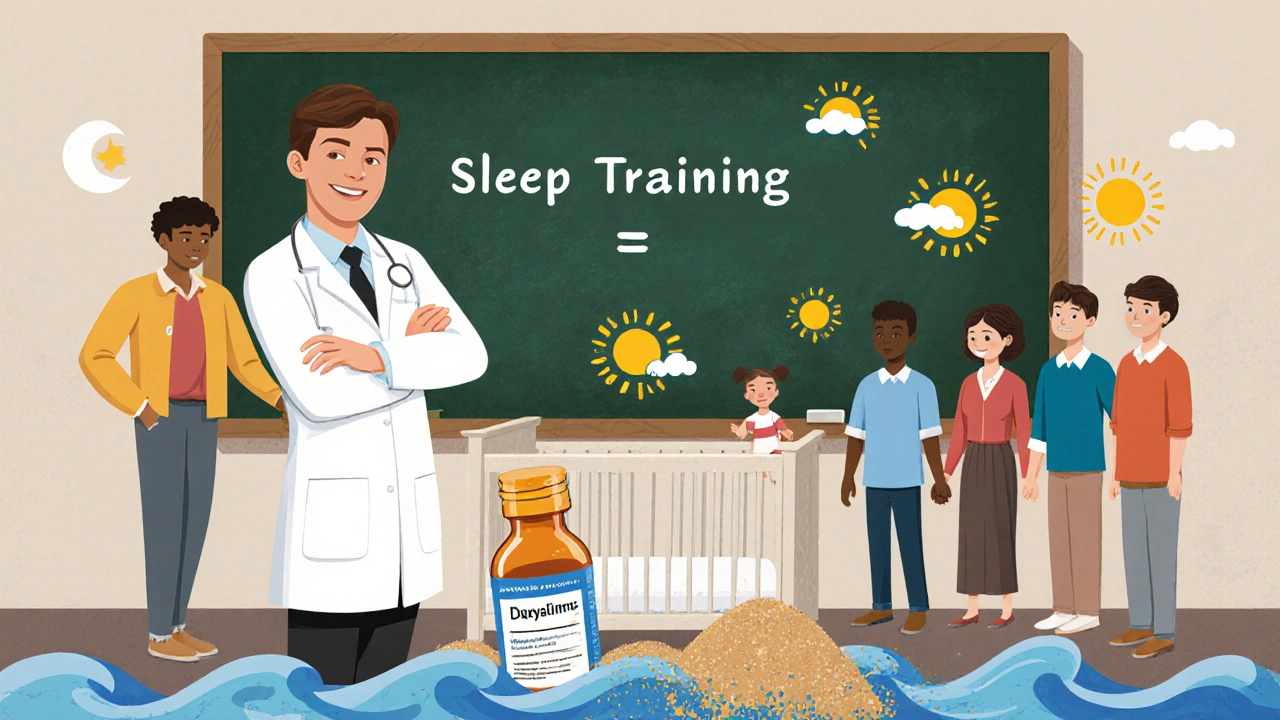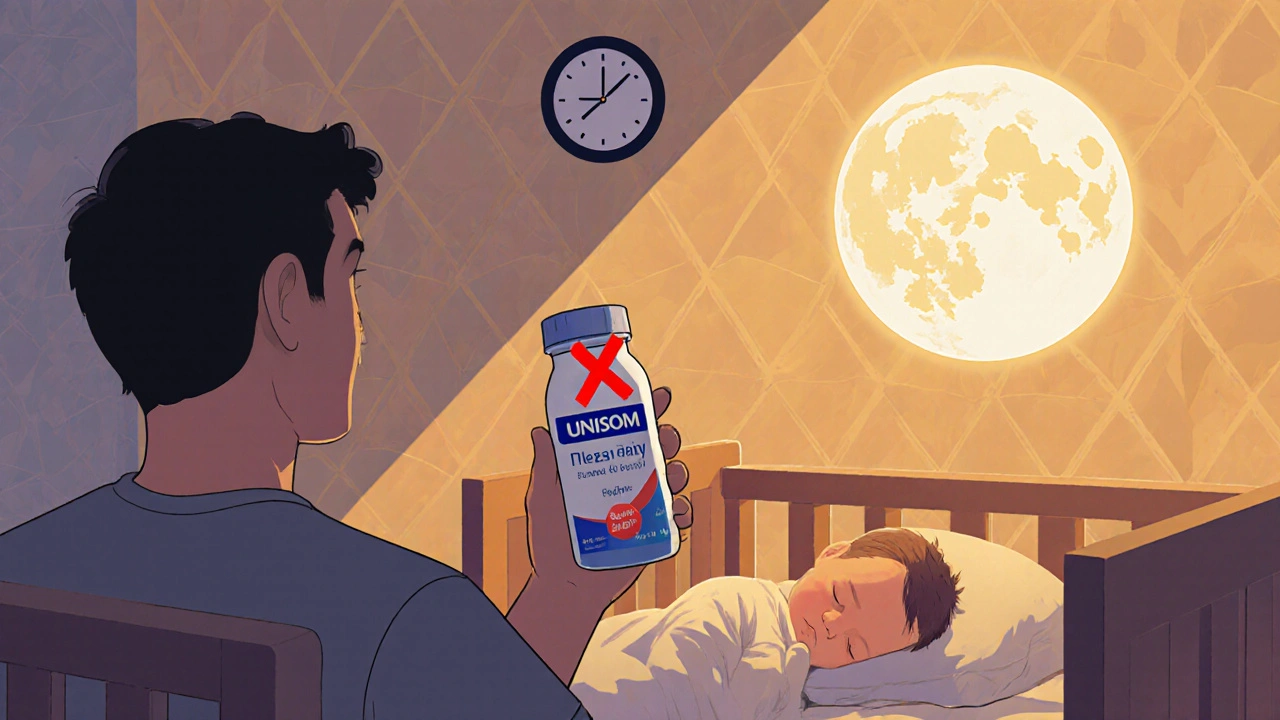Parents searching for a quick fix to their infant’s sleep problems often stumble upon doxylamine - an antihistamine found in over-the-counter sleep aids like Unisom. But is it safe? Is it effective? And more importantly, should you ever use it to help your baby sleep through the night?
What Is Doxylamine?
Doxylamine is an antihistamine that blocks histamine receptors in the brain, which can cause drowsiness. It’s been used for decades in adults as a short-term sleep aid. In the U.S., it’s the active ingredient in Unisom SleepTabs and some combination cold and flu medications. But it’s never been approved by the FDA for use in infants under 2 years old.
Doctors may occasionally prescribe it off-label for older children with severe sleep disorders, but even then, it’s rare. For babies, the risks far outweigh any perceived benefits. The American Academy of Pediatrics (AAP) explicitly advises against using any over-the-counter sleep medications, including doxylamine, in infants.
Why Do Parents Consider Doxylamine for Sleep Training?
Exhausted parents are desperate for relief. When sleep training methods like the Ferber method or gentle fading don’t seem to work fast enough, some turn to online forums, well-meaning relatives, or even unverified social media posts suggesting a tiny dose of doxylamine can "reset" a baby’s sleep cycle.
These stories often sound convincing: "My neighbor gave her 6-month-old half a tablet and she slept 8 hours straight!" But anecdotes aren’t science. Infants metabolize drugs differently than adults. Their liver and kidneys aren’t fully developed, so medications can build up in their system, leading to dangerous side effects.
The Real Dangers of Doxylamine in Infants
Using doxylamine for infant sleep carries serious, documented risks:
- Respiratory depression - Doxylamine can slow breathing, especially in babies under 12 months. There have been multiple case reports of infants requiring emergency care after accidental or intentional exposure.
- Paradoxical agitation - Instead of calming down, some babies become hyperactive, irritable, or have seizures after taking antihistamines.
- Overdose risk - A single adult tablet contains 25 mg of doxylamine. A baby weighing 10 pounds could suffer life-threatening toxicity from as little as 1-2 mg per kilogram of body weight.
- Masking underlying issues - Poor sleep in infants is often caused by reflux, hunger, teething, or sleep apnea. Doxylamine doesn’t fix these - it just hides them.
A 2022 study in Pediatrics reviewed 47 cases of pediatric antihistamine overdoses over five years. Nearly 70% involved children under 2, and 1 in 5 required intensive care. None of these cases were medically supervised.

What Does Sleep Training Actually Require?
True sleep training isn’t about drugs - it’s about teaching your baby how to fall asleep on their own. Healthy sleep habits develop through consistency, routine, and timing - not chemicals.
By 4-6 months, most babies are physiologically ready to sleep longer stretches at night. But they still need help learning how to self-soothe. That means:
- Putting your baby down drowsy but awake, so they learn to fall asleep without being rocked or fed.
- Keeping a predictable bedtime routine: bath, book, feed, sleep - every night.
- Responding to night wakings with minimal stimulation - dim lights, quiet voices, no screens.
- Waiting a few minutes before rushing in when they cry. Many babies will settle themselves if given a chance.
It’s hard. It’s tiring. But it works. Studies show that structured sleep training methods improve both infant sleep and parental well-being without any medications.
When Is Medication Ever Appropriate for Infant Sleep?
There are rare exceptions. If your baby has a diagnosed neurological condition, severe reflux that disrupts sleep, or a sleep disorder like central sleep apnea, a pediatrician may consider medication - but only after exhausting behavioral options and under strict supervision.
In those cases, doctors might prescribe melatonin - not doxylamine - because melatonin is a hormone naturally produced by the body, and its use in children has more research backing. Even then, doses are tiny (0.5-1 mg), and long-term effects are still being studied.
Doxylamine? Never. Not even in a pinch.

What Should You Do Instead?
If your baby isn’t sleeping well, here’s what to try before reaching for anything in the medicine cabinet:
- Check for medical causes - Rule out reflux, ear infections, allergies, or low milk supply with your pediatrician.
- Optimize the sleep environment - Cool, dark, quiet room. White noise can help mask sudden sounds.
- Watch daytime sleep - Over-tired babies sleep worse. Keep naps consistent and avoid letting them sleep past 4 p.m.
- Try a sleep schedule - Even at 3 months, babies respond to predictable routines. Feed at 7 p.m., bath at 7:30, bed by 8.
- Use gentle sleep training - The chair method, pick-up-put-down, or fading techniques are proven and safe.
Most babies start sleeping 6-8 hours straight by 6 months - naturally. You don’t need a pill to get there.
What About Herbal Remedies or "Natural" Sleep Aids?
Some parents turn to chamomile tea, valerian root, or "baby sleep drops" marketed as natural. But these aren’t regulated. They may contain unlisted ingredients, including sedatives or contaminants. The FDA has issued warnings about several herbal sleep products found to contain diphenhydramine or other antihistamines - the same dangerous compounds as doxylamine.
There’s no such thing as a "safe" herbal sleep aid for infants. If it makes your baby sleepy, it’s likely doing something to their brain or nervous system - and you don’t know what.
Final Takeaway: Sleep Training Doesn’t Need a Pill
Doxylamine has no place in infant sleep training. It’s not a shortcut. It’s a risk - one that could land your baby in the hospital. Every parent wants their child to sleep through the night. But true rest comes from healthy habits, not chemicals.
It’s okay to feel overwhelmed. It’s okay to ask for help. Talk to your pediatrician, join a parent support group, or hire a certified sleep consultant. But don’t reach for doxylamine. Your baby’s developing brain deserves better.
Can doxylamine be used safely in babies under 2 years old?
No. Doxylamine is not approved for use in infants under 2 years old by the FDA or any major pediatric organization. It carries serious risks including respiratory depression, seizures, and overdose. Even small doses can be dangerous due to how infants metabolize drugs.
Why do some people say doxylamine helped their baby sleep?
Anecdotes are not evidence. Babies naturally begin sleeping longer stretches between 4 and 6 months as their circadian rhythms develop. Parents often misattribute this normal development to a medication they gave. In reality, the baby was ready to sleep longer regardless of the drug.
Is melatonin safer than doxylamine for infants?
Melatonin is sometimes used under medical supervision for children with neurodevelopmental disorders or delayed sleep phase syndrome. But even melatonin isn’t recommended for healthy infants. It’s not a sleep aid - it’s a hormone that helps regulate sleep timing. Never give it to a baby without a doctor’s guidance.
What are the signs of doxylamine overdose in babies?
Signs include extreme drowsiness, difficulty breathing, flushed skin, rapid heartbeat, confusion, seizures, or unresponsiveness. If you suspect overdose, call 911 or your local poison control center immediately. Do not wait for symptoms to worsen.
How long does it take for infant sleep training to work?
Most babies show improvement within 3-7 days of starting a consistent sleep routine. Full results - sleeping 6-8 hours straight - typically take 2-4 weeks. Progress isn’t always linear. Night wakings may increase temporarily as your baby learns new skills. Patience and consistency are key.

Comments
Emily Barfield November 1, 2025 at 05:32
Oh my god. I just read this and I’m crying. Not because I’m dramatic-though I am-but because I gave my 5-month-old half a Unisom tablet last winter when I was sleep-deprived and desperate. I thought it was harmless. I thought everyone did it. I didn’t know I could’ve killed her. I didn’t know. And now? Every time she sleeps through the night, I whisper thank you to the universe. No pills. No shortcuts. Just her, me, and the quiet. I’m so sorry to anyone who’s been there.
Reginald Maarten November 2, 2025 at 14:02
Actually, the AAP doesn’t explicitly ban doxylamine-it merely advises against it. There’s a critical distinction. The FDA hasn’t approved it for infants under two, yes-but off-label prescribing is legal, common, and often clinically necessary. You’re conflating regulatory status with medical consensus. Also, melatonin isn’t ‘safer’-it’s just less studied in infants. Both lack robust pediatric RCTs. The real issue is that parents are being fed fear-based narratives instead of nuanced risk-benefit analysis.
Jonathan Debo November 4, 2025 at 05:11
Reginald is technically correct, but let’s be honest: the entire article is a masterclass in alarmist pseudoscience. You cite a 2022 Pediatrics study with 47 cases-out of how many millions of infants? That’s a rate of 0.0001%. Meanwhile, sleep deprivation in parents causes more infant injuries, postpartum depression, and marital breakdowns than any antihistamine ever could. The real danger isn’t doxylamine-it’s the moral panic that makes exhausted parents feel like criminals for trying anything. And yes, I’ve read the FDA labels. I’ve read the case reports. I’ve also read the pediatric sleep literature. This isn’t science. It’s sanctimony with footnotes.
Robin Annison November 4, 2025 at 07:15
I think we’re missing the deeper question: Why do we feel the need to ‘fix’ infant sleep so urgently? Historically, co-sleeping, night feeding, and fragmented sleep were the norm for millennia. The idea that a baby should sleep 8 hours straight by 6 months is a modern, Western, middle-class expectation-not a biological imperative. Maybe the problem isn’t the baby’s sleep… it’s our cultural intolerance for natural human rhythms. I’m not advocating for doxylamine. I’m asking: Are we pathologizing normal development because we’ve lost the ability to rest ourselves?
Abigail Jubb November 5, 2025 at 18:22
How dare you imply that parents who consider doxylamine are reckless? Have you ever held a screaming infant for 14 hours straight while your partner sleeps on the couch? Have you ever stared at the ceiling at 3 a.m., whispering, ‘Please, just one night of peace’? This article reads like it was written by someone who has never held a crying baby for longer than it takes to change a diaper. You’re not helping. You’re judging. And you’re making mothers feel like monsters for wanting to survive.
George Clark-Roden November 6, 2025 at 16:51
I’ve been a pediatric nurse for 22 years. I’ve seen the seizures. I’ve seen the intubations. I’ve held the tiny bodies that stopped breathing because a well-meaning grandma gave them ‘a little something to sleep.’ I’ve also held the mothers afterward, as they sobbed, ‘I just wanted her to rest.’ This isn’t about judgment. It’s about survival. And yes-sleep training works. It’s slow. It’s messy. It’s hard. But it’s the only path that doesn’t risk your child’s life. I’ve seen families heal without drugs. I’ve seen them break with them. Please. Don’t gamble with your baby’s brain. There’s no such thing as a ‘tiny dose’ when it’s a 10-pound infant.
Hope NewYork November 8, 2025 at 01:24
lol why is everyone so scared of a little unisom? my cousin gave her baby a quarter of a pill and now she’s a genius who reads at 2. also, pediatricians are just in the pocket of big pharma. melatonin? yeah right. that’s just synthetic sleep juice. wake up people. they’re lying to us.
Bonnie Sanders Bartlett November 8, 2025 at 12:33
If you’re struggling, you’re not alone. I’ve been there. I hired a sleep consultant. I cried. I felt guilty. But I didn’t give my baby a pill. I sat in the chair next to her crib for three weeks. I held her hand. I whispered lullabies. And one night, she fell asleep on her own. It wasn’t magic. It was patience. You don’t need a drug. You need support. Reach out. Talk to someone. You’re doing better than you think.
Melissa Delong November 9, 2025 at 10:55
Did you know that the FDA approved doxylamine for adults in 1959? Yet, in 2024, it’s considered a ‘dangerous’ substance for infants? Coincidence? Or is this part of a broader agenda to control parental autonomy under the guise of ‘child safety’? The same organizations that warn against doxylamine also push mandatory vaccines, school uniforms, and screen-time limits. Who benefits? Who profits? I’m not saying give your baby pills-but I am saying: question the narrative.
Marshall Washick November 11, 2025 at 01:15
I read this article after a 4 a.m. feeding. My daughter is 7 months. She still wakes twice. I used to feel like a failure. Now I feel like I’m part of a quiet revolution-one where we stop treating babies like broken machines and start treating them like humans who need time, patience, and love. I didn’t need doxylamine. I needed to stop listening to the internet. I needed to trust my gut. And I needed to know that it’s okay to be exhausted. It doesn’t make me a bad parent. It makes me a human. Thank you for writing this. I’m sharing it with every new mom I know.